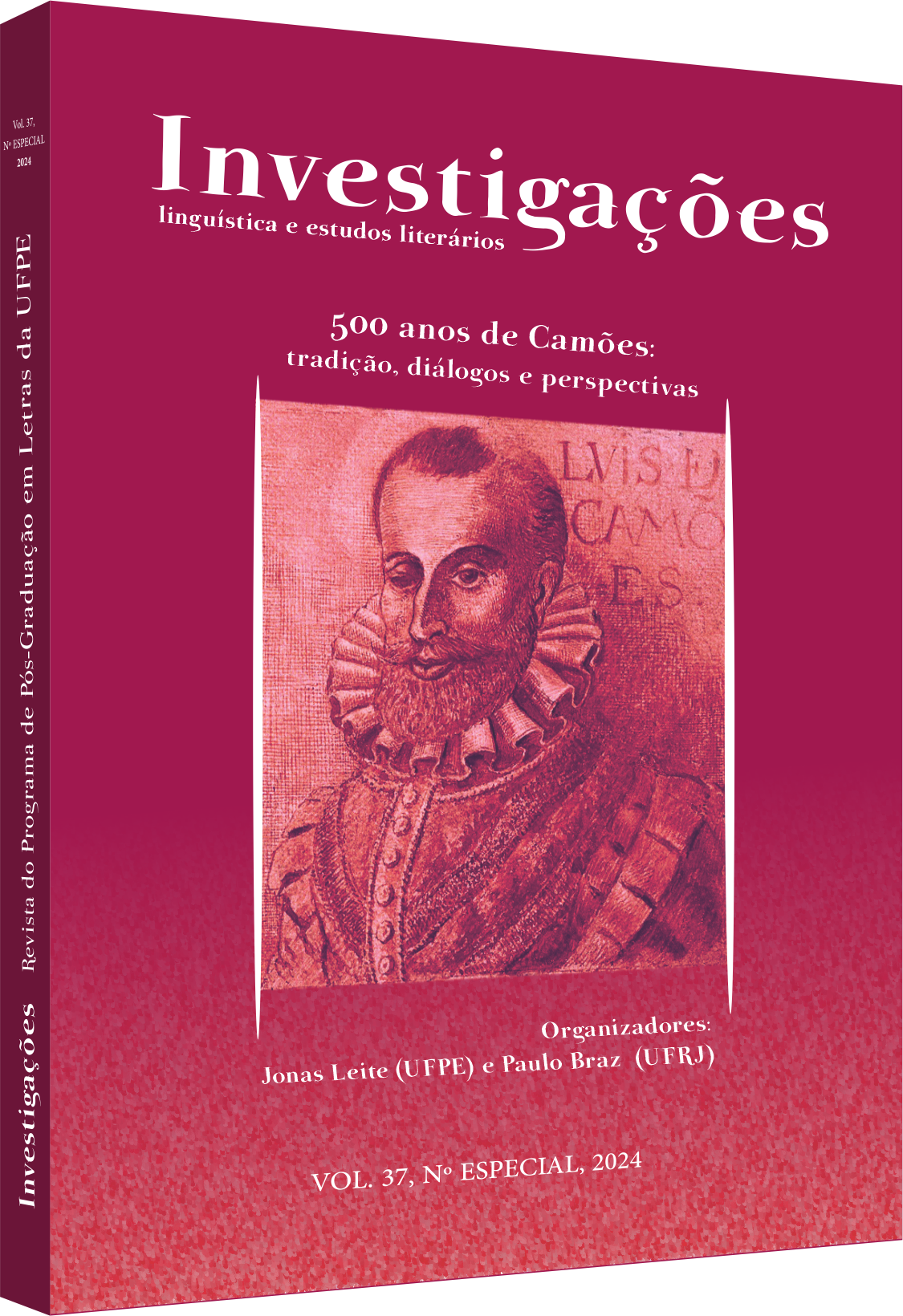Harmony in ancient and renaissance epistemes: ethics, virtue and heroicity in Os lusíadas
DOI:
https://doi.org/10.51359/2175-294x.2024.263049Keywords:
Os lusíadas, episteme, renaissance, rhetoricAbstract
This article presents some considerations of the role played by the concept of harmony in the constitution of ancient and Renaissance epistemes. From the visualization of how Humanism interprets the epic genre through a subordination of poetics to rhetoric (Alves, 2001), we seek to highlight that the heroes' journey in Os lusíadas is geared in line with the basic strategies of Aristotle's rhetorical systematization (2011b), and precisely because he had to align his ethical narrative in accordance with the demonstrative science required by his time, Camões puts the episteme with which he dialogues into question.
References
AGUIAR E SILVA, Vítor Manuel. Função e significado do episódio da ‘Ilha dos Amores’ na estrutura de Os lusíadas. In: AGUIAR e SILVA, Vítor Manuel. Camões: Labirintos e Fascínios. Lisboa: Cotovia, 1994.
ALVES, Hélio J. S. Camões, Corte-Real e o sistema da epopeia quinhentista. Universidade de Coimbra: Coimbra, 2001.
ARISTÓTELES. Metafísica. Tradução, introdução e notas: Carlos Humberto Gomes. Lisboa: Edições 70, 2021.
ARISTÓTELES. Órganon: Categorias, Da interpretação, Analíticos anteriores, Analíticos posteriores, Tópicos, Refutações sofísticas. Tradução, textos adicionais e notas: Edson Bini. 3. ed. São Paulo: Edipro, 2016. (Série Clássicos Edipro).
ARISTÓTELES Ética a Nicômaco. Tradução: Edson Bini. 4. ed. São Paulo: Edipro, 2014.
ARISTÓTELES. Poética. Tradução: Edson Bini. São Paulo: Edipro, 2011a.
ARISTÓTELES. Retórica. Tradução: Edson Bini. São Paulo: Edipro, 2011b.
CAMÕES, Luís Vaz de. Os lusíadas. Coimbra: Almedina; Colégio das Artes da Universidade de Coimbra, 2016.
EPICURO. Cartas de Epicuro: sobre a felicidade, sobre os fenômenos celestes, sobre a filosofia da natureza. Edição bilíngue. Tradução: Edson Bini. São Paulo: Edipro, 2021.
EPITECTO. Manual de Epitecto: a arte de viver melhor. Edição bilíngue. Tradução: Edson Bini. São Paulo: Edipro, 2021.
FOUCAULT, Michel. As palavras e as coisas: uma arqueologia das ciências humanas. Tradução: Salma Tannus Muchail. 9. ed. São Paulo: Martins Fontes, 2007. (Coleção Tópicos).
GOMBRICH, E. H. A história da arte. Tradução: Álvaro Cabral. Rio de Janeiro: LCT, 2015.
HESÍODO. Os trabalhos e os dias. Edição bilíngue. Introdução, tradução e comentários: Mary de Camargo Neves Lafer. 2. ed. São Paulo: Iluminuras, 2019.
HOMERO. Ilíada. Edição bilíngue. Tradução, posfácio e notas: Trajano Vieira. São Paulo: Editora 34, 2020.
HOMERO. Odisseia. Edição bilíngue. Tradução, posfácio e notas: Trajano Vieira. 4.ed. São Paulo: Editora 34, 2022.
HORÁCIO. Arte Poética. In: ARISTÓTELES; HORÁCIO; LONGINO. A poética clássica. Tradução: Jaime Bruna. 12. ed. São Paulo: Cultrix, 2005.
HOMERO. Odes. Edição bilíngue. Tradução, introdução e notas: Pedro Braga Falcão. São Paulo: Editora 34, 2021.
JAEGER, Werner Wilhelm. Paidéia: a formação do homem grego. Tradução: Artur M. Pereira. 6. ed. São Paulo: WMF Martins Fontes, 2013.
MOURA, Vasco Graça. Camões e a divina proporção. In: MOURA, Vasco Graça. Camões e a divina proporção. Lisboa: Inova/Artes, 1985.
PLATÃO. A república (ou Da justiça). Tradução, textos adicionais e notas: Edson Bini. 3. ed. São Paulo: Edipro, 2019. (Clássicos Edipro).
SILVA, Luís de Oliveira e. Introdução. In: ALVES, Hélio J. S. Camões, Corte-Real e o sistema da epopeia quinhentista. Universidade de Coimbra: Coimbra, 2001.
VIRGÍLIO. Eneida. Edição bilíngue. Tradução: Carlos Alberto Nunes; organização, apresentação e notas: João Angelo Oliva Neto. 3. ed. São Paulo: Editora 34, 2021.
Downloads
Published
How to Cite
Issue
Section
License
Copyright (c) 2024 Pedro Alaim

This work is licensed under a Creative Commons Attribution 4.0 International License.
Authors who publish with Revista Investigações agree to the following terms:
Authors retain copyright and grant the journal right of first publication with the work simultaneously licensed under the Creative Commons Attribution 4.0 International (CC BY 4.0) license that allows others to share the work with an acknowledgement of the work's authorship and initial publication in this journal.
Authors are able to enter into separate, additional contractual arrangements for the non-exclusive distribution of the journal's published version of the work (e.g., post it to an institutional repository or publish it in a book), with an acknowledgement of its initial publication in this journal.
You are free to:
Share — copy and redistribute the material in any medium or format for any purpose, even commercially.
Adapt — remix, transform, and build upon the material for any purpose, even commercially.
The licensor cannot revoke these freedoms as long as you follow the license terms.
Under the following terms:
Attribution — You must give appropriate credit , provide a link to the license, and indicate if changes were made . You may do so in any reasonable manner, but not in any way that suggests the licensor endorses you or your use.
No additional restrictions — You may not apply legal terms or technological measures that legally restrict others from doing anything the license permits.

